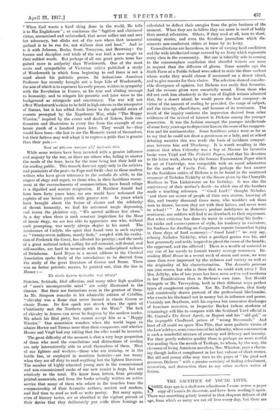THE SACRIFICE OF YOUNG LIVES.
SOME days ago in a shell-torn schoolroom I came across a paper copy of Cicero's De Senectute, and have been reading it again. There was something grimly ironical in that eloquent defence of old age, from which so many are cut off here every day, but there are also some words which I think are good to remember at this time : " Quod cuique temporis ad vivendum datur, eo debet ease contentus. Neque enim histrioni, ut placeat, peragenda est Tabula ; modo, in quocumque fuerit actu, probetur nec sapienti usque ad Plaudite veniendum est. Breve enim tempus aetatis satin eat longim ad bene laonesteque vivendum."—(De Senect. 69, 70.) Sir Robert Allison renders it in his recent and pleasant version :- " Let each think what he has of life enough.
Why ev'n the actor to secure applause Need not play to the end ; if but he do His best, he will be cheered ; if wise, he'll stop Before he reach the final Plaudite.'
A little time's enough, in which to live A good and honest life."
I was struck with the remarkable similarity of this passage to
the words used by Lieutenant W. G. C. Gladstone in a letter written shortly before his death in action : " It is not the length of exist- ence that counts, but what is achieved during that existence, how- ever short."
Perhaps I may also bring before your readers a truly noble
extract from Froude's Short Studies oat Great Subjects, lately sent to me from England :—" In a few hours Sir Richard Grenville,
feeling his end approaching, showed not any sign of faintness, but spake these words in Spanish, and said : Here die I, Richard Grenville, with a joyful and quiet mind, for that I have ended my life as a true soldier ought to do that hath fought for his country, Queen, religion and honour. Whereby my soul most joyfully departeth out of this body, and shall always leave behind it an ever- lasting fame of a valiant and true soldier that hath done his duty, as he was bound to do.' When he had finished these and other such like words, he gave up the ghost with great and stout courage, and no man could perceive any sign of heaviness in him So it was with all these men. They were cut off in the flower of their days, and few of them laid their bones in the sepulchres of their fathers. They knew the service which they had chosen, and they did not ask the wages for which they had not laboured. Life for them was no summer holiday, but a holy sacrifice offered up to duty, and what their Master sent was welcome. Beautiful is old age— beautiful as the slow-dropping mellow autumn of a rich glorious summer. In the old man, Nature has fulfilled her work ; she loads
him with her blessings ; she fills hint with the fruits of a well-spent life ; and, surrounded by his children and his children's children, she rocks him softly away to a grave,to which he is followed with blessings. God forbid that we should not call it beautiful. It is beautiful, but not the most beautiful. There is another life, hard, rough and thorny, trodden with bleeding feet and aching brow ; the life of which the Cross is the symbol ; a battle which no peace follows, this side the grave ; which the grave gapes to finish, before the victory is won ; and—strange that it should be so—this is the highest life of man. Look back along the great names of history ; there is none whose life has been other than this. They to whom it has been
given to do the really highest work in this earth—whoever they are, Jew or Gentile, Pagan or Christian, warriors, legislators, philoso- phers, priests, poets, kings, slaves—one and all their fate has been the same—the same bitter cup has been given them to drink. And so it was with the servants of England in the sixteenth century. Their life was a long battle, either with the elements or with men ; and it was enough for them to fulfil their work, and to pass away in the hour when God had nothing more to bid them do. They did not complain, and why should we complain for them ? Peaceful life was not what they desired, and an honourable death had no terrors for them. Theirs was the old Grecian spirit and the great heart of the Theban poet lived again in them :—
Oztveit, eaTertv tivdvia, Ti a TtS druiereov yipar dv 07(67111 Kai/Afros E#Ot flaTI2V, iordrran, KaXar tilhAopos; [Since death is our destiny, why should one vainly cherish an inglorious old age, sunk in gloom, bereft of all that is fine ?— Pinder, Odes i., 132-4 ] ' Seeing,' in Gilbert's * own brave words, that death is inevitable and the fame of virtue is immortal, wherefore in this behalf mutare vel tintere sperno.' "
If Froude's panegyric is true of the servants of England in the sixteenth century, then how much more so of her servants in the



























 Previous page
Previous page